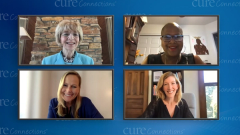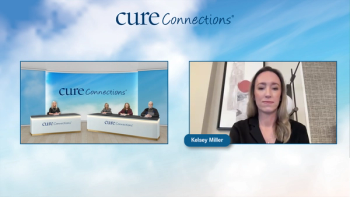
Finding a Support Group for Metastatic Breast Cancer Patients
The panel discusses strategies for locating appropriate support groups for patients with metastatic breast cancer.
Episodes in this series

These are the experiences and opinions of panelists, not physicians.
Shirley A. Mertz, MA, JD: If I'm looking for ways to find a support group, Lisa, and even if you're repeating, should I first ask where I'm treated if they have a support group?
Lisa Laudico: I would encourage that because as a starting place but then if it doesn't work out or your treatment center doesn't have a support group for metastatic breast cancer patients, I think that's really important. I could talk a lot about Allyship and about how we bring along our early stages and when it's a good time to bring along early stages to help with metastatic breast cancer issues. I can talk about that later but in terms of your support group at your center because you could actually meet people that are in your community because they're treated at the same place. So that's the first step. When that doesn't work out, I would go to places like share cancer support, Living Beyond Breast Cancer, and trying to tap into those organizations that have support groups that are online and as I said, shares just really blowing the doors out of all the different permutations and combinations. They have really young early diet, de novo metastatic breast cancer patients of which tragically we have far too many young people newly getting diagnosed, there's a real issue there. We've got support groups for that, we've got support groups for people at different sort of ages and stages, I think that's also really important and people that perhaps the different subtypes we've actually started to get into that too and so there's opportunities depending on where your fit is. So that's I think what you're looking at.
Shirley A. Mertz, MA, JD: Another place, the way I met other patients, I did not meet another metastatic breast cancer patient for a year and a half. I was diagnosed within a practice where the gentleman says there's an old woman who has the disease but she's not going to help you. But what helped me was I attended a metastatic breast cancer conference and this whole auditorium, it was at MD Anderson, whole auditorium was full of women with metastatic disease and my mouth just dropped. There are other people. What's regrettable that you've already mentioned, Lisa, is that we are in COVID which has stifled some of our interactions. But if we can go beyond that and get back to where we can go to metastatic breast cancer conferences to learn about our disease, so important people if you're newly diagnosed, learn diagnose, learn about your subtype, and then you will meet other people. You'll make friends and thanks to the wonders of iPhones or whatever phones and zoom, you can talk to each other and develop some friendships. Sheila, in the last couple of minutes here, anything you want to add to this conversation about trying to meet other people or anything else we've talked about? I want to give you a chance.
Sheila McGlown: Like Lisa was saying, support groups and maybe Facebook groups, just finding out where you fit and I hate that we're blocked into these stages like stage one, stage two and I guess I've been blessed that nobody has ever alienated me because I'm stage four but I have had people when I've been at conferences say "Well, this person doesn't want to talk to me because I'm stage four" and it's just like but cancer is cancer no matter what, if it stays zero or stage four, we should all be treated the same thing. And I wanted to say one more thing, sometimes- I know I'm going back to self-care but sometimes I stay off of Facebook for weeks just so I can wait and a clear balance of what I'm supposed to be doing and where I'm at. That's another self-care thing that I do.
Shirley A. Mertz, MA, JD: That is a very good self-care because I was presenting it as if what are we opening our mouth and putting down, but it has to do with sleep and what we hear, the news can be a bummer, et cetera.
This transcript has been edited for clarity.




